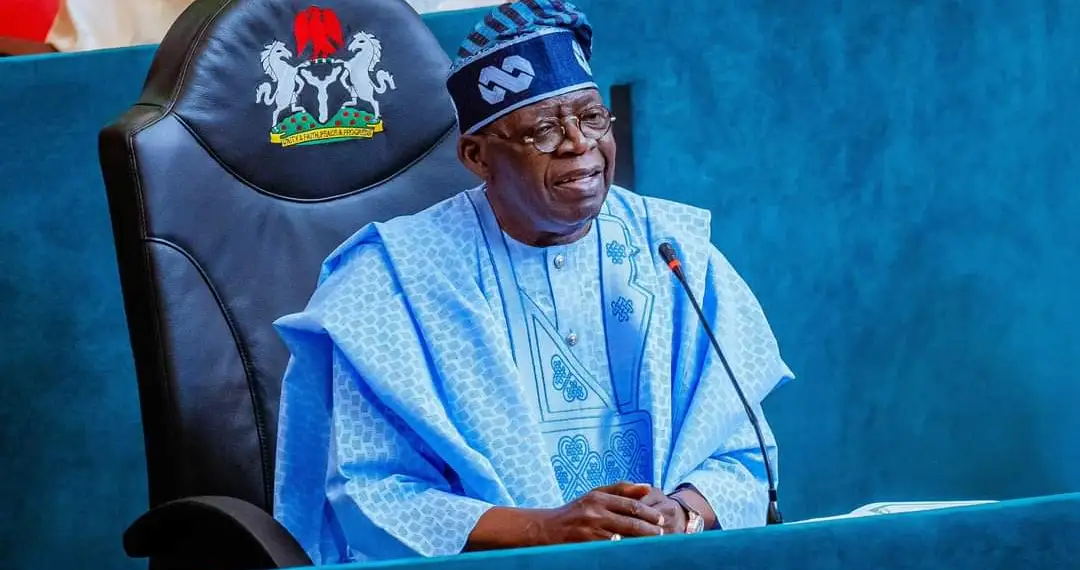President Bola Tinubu has unveiled the Nigerian government’s N49.7 trillion budget proposal for 2025, emphasizing national security, infrastructure development, and human capital growth.
The budget, aptly named “Budget of Restoration: Securing Peace, Rebuilding Prosperity,” outlines substantial allocations in critical sectors, as well as a projected deficit of N13.39 trillion, to be financed through extensive borrowing.
The ambitious proposal prioritizes defense, infrastructure, and human development, with N4.91 trillion earmarked for defense and security, and N4.06 trillion dedicated to infrastructure projects such as the Lagos-Calabar Coastal Highway and the Sokoto-Badagry Highway.
In addition, N3.52 trillion has been allocated to education, while the health sector will receive N2.48 trillion to enhance healthcare delivery and provide essential medical supplies.
Speaking before a joint session of the National Assembly, President Tinubu highlighted the government’s resolve to bolster security and repair the nation’s aging infrastructure. He underscored the importance of empowering Nigeria’s youth and expanding access to quality healthcare as central goals in his administration’s human capital development strategy.
“We are making bold investments in defense, infrastructure, and human capital. The future of our country depends on the prosperity we build today,” Tinubu stated.
He also projected N34.82 trillion in revenue for 2025, leaving a significant gap of N13.39 trillion, which will be financed through external and domestic borrowing.
The budget is based on several key economic assumptions, including a decrease in inflation from 34.6% to 15%, and an improved exchange rate of N1,500 per US dollar from the current N1,700. Additionally, oil production is expected to rise to 2.06 million barrels per day, bolstered by increased export capacity and reduced upstream costs.
“Achieving these ambitious targets will require robust financial strategies and disciplined execution, while the challenges are substantial, our determination is unwavering.”
The budget is also designed with debt servicing in mind, with N15.81 trillion allocated to manage Nigeria’s rising debt obligations. President Tinubu noted that these financial strategies were vital to ensuring the nation’s long-term stability and growth.
In his remarks, the President also celebrated Nigeria’s GDP growth, which increased by 3.46% in the third quarter of 2024, a significant rise from 2.54% in the same period of 2023.
He also cited Nigeria’s foreign reserves, which now stand at $42 billion, as a safeguard against global economic uncertainties. However, he acknowledged persistent challenges such as inflation and insecurity, while asserting that his administration’s reforms were already yielding positive results.
The budget’s focus on addressing national security, rebuilding infrastructure, and investing in agriculture to reduce food insecurity are seen as integral to Nigeria’s recovery. Furthermore, Tinubu reiterated his commitment to a favorable business environment by supporting the private sector’s role in driving economic transformation.
The Director-General of the Budget Office of the Federation, Tanimu Yakubu, described the budget as a “bold response” to the nation’s pressing needs, designed to restore stability and rebuild trust in governance.
He emphasized that the government was committed to diversifying revenue sources, with N36.35 trillion in projected revenue, including increased tax collection and earnings from government-owned enterprises.
The proposal now awaits deliberation and approval by the National Assembly. Lawmakers have expressed optimism about the direction the budget sets for Nigeria, although there are concerns regarding the mounting debt and the feasibility of achieving the revenue and economic targets.
Lawmakers’ Reactions
Senate and House of Representatives members have largely praised the budget for its focus on key sectors such as security and infrastructure, though they have raised concerns about its heavy reliance on borrowing.
Senator JimIsah Jibrin, chairman of the Senate Committee on Customs, stressed the need for significant improvements in Nigeria’s revenue generation capacity, highlighting that 15% of the budget is earmarked for debt servicing. He warned against a “debt peonage system” and called for increased efficiency within revenue-generating agencies to reduce deficits.
Senator Victor Umeh lauded the budget’s prioritization of human capital development, education, and infrastructure but cautioned that the effectiveness of these allocations must be closely monitored.
Senator Adams Oshiomhole commended the administration’s realistic approach, noting that while reforms may be painful, they are necessary for Nigeria’s long-term growth. “Reforms are essential, but we must ensure that every allocation is used to improve the lives of ordinary Nigerians,” he asserted.
Senator Osita Izunaso emphasized that the unprecedented N4.91 trillion allocation for defense and security reflects the administration’s commitment to tackling the country’s security challenges. However, he also stressed the importance of translating these financial allocations into tangible improvements in the daily lives of Nigerians.
Opposition Criticism
The Peoples Democratic Party (PDP) has criticized the budget, calling it “unrealistic, opaque, and insincere.” The party expressed concern that the budget would further exacerbate insecurity, poverty, and economic hardship, pointing to the lack of provisions for vital sectors such as agriculture and electricity.
In a statement, PDP spokesperson Debo Ologunagba condemned the lack of meaningful investment in sectors that drive the economy, asserting that the proposed budget is not designed to address Nigeria’s most urgent issues. The PDP also criticized the lack of transparency, particularly in the absence of a detailed breakdown of the capital and recurrent expenditure.
Budget Exclusions
Meanwhile, the House of Representatives Public Accounts Committee has recommended the exclusion of several Ministries, Departments, and Agencies (MDAs) from the 2025 budget due to their failure to account for previous allocations. The committee has called for the exclusion of agencies such as the National Examination Council, the University of Ibadan, and various federal hospitals, among others, due to their persistent failure to comply with financial oversight measures.
The National Assembly has also moved to extend the capital component of the 2024 budget until June 2025 to facilitate the execution of pending projects. Despite the late presentation of the 2025 budget, both chambers of the legislature have committed to ensuring that it is implemented efficiently.

